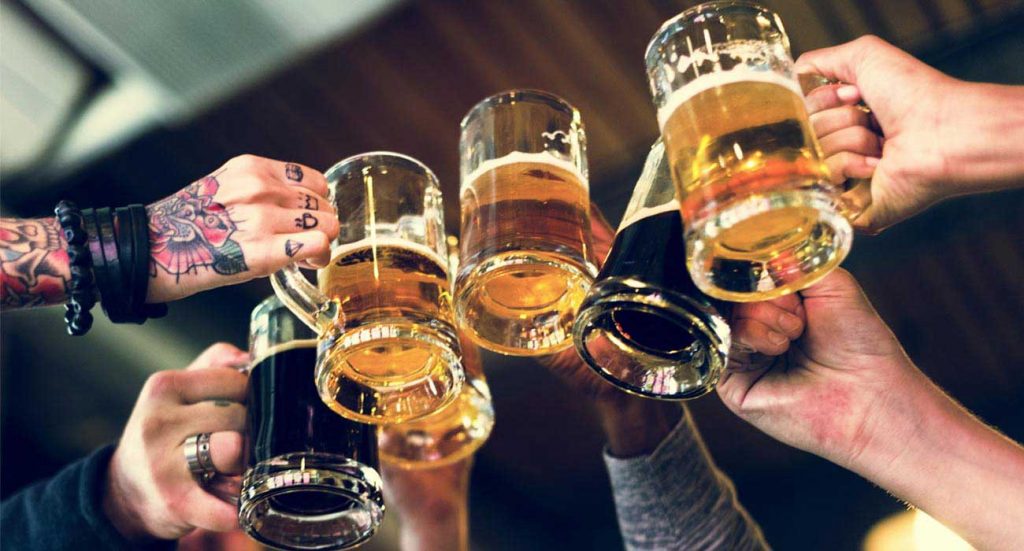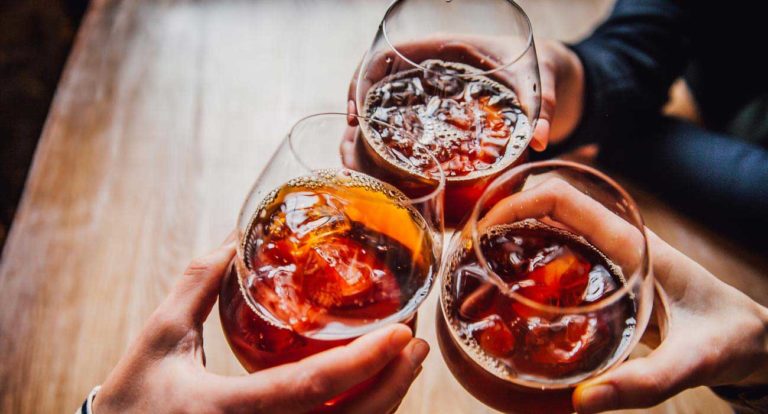Transport has never been more affordable, and that means we can travel further and more often. But for most of us, that also means wandering around beautiful towns and cities in places where we don’t understand the language. Now, with digital aids, hand waving and a bit of help from passersby, getting your message across is possible, but there are some situations where you really want to communicate directly.
At the end of the day as you are enjoying a drink, saying “Cheers” to someone in their own language is all you need to show them friendship, and is the one word you should always memorize. No amount of “please”, “thank you” or “How much is the sexually inappropriate sculpture?” said in the local language can ever have the same effect as being able to say cheers when it comes to making new friends and feeling part of that new culture for a while.
The interesting thing about “Cheers”, is that every culture has a version of it, and the first example of it written down was recorded in 1255AD, Now, no one wants to stand in the way of history, so on your next trip, get your cheer on in the local language with our handy guide.
Mandarin
We start off with Mandarin Chinese, because more people speak it than any other language in the world. Anyone who has seen Mandarin Chinese writing will know that it is so different to English that it is also one of the hardest languages to learn, but when it comes to the only word you need to know, that is no barrier.
In Mandarin, it is written as 乾杯, which of course, means little if you don’t speak Mandarin. In fact, it is easy to learn, and is pronounced Gan bay. The literal translation of that is ‘dry the glass’.
German
If you visit Germany, you will, at some point, end up in a bierkeller, and knowing how to say “Cheers” becomes a skill of necessity. In fact, there are two versions in Germany, depending on whether you are enjoying a beer or a nice glass of wine.
For clanking the beer tankards together, the word you need is Prost, which is pronounced exactly as it looks. For wine, then you should be saying Zum wohl, which is pronounced Tsum vohl. With that information, you can now safely travel to Oktoberfest.
As an aside, Prost is also used in The Netherlands, although the spelling is a little different (proost), the pronunciation is the same and the locals will get what you are trying to say.

French
A language common across parts of Africa and Canada as well as France itself, your French “Cheers” can get you by in many situations. In fact, if you visit France itself, it would be challenging to go a day without being in a situation where you needed to say it.
The good news is that this is an easy one, the French word is “Santé!”, and the literal translation is “to your health!”. Pronounced “Sahn Tay”, say it with enthusiasm.
Belgium uses the same word, although here there are different traditions depending on where you are. In Brussels, it’s common to stand when saying “Santé!”, while in the Flemish regions such as Antwerp or Ghent, locals will raise the glass twice, saying “Santé!” during the toast, and then again at the end.
Italian
A culture full of joy, the love of life and ‘aperitivos‘, it is no surprise that the Italians are enthusiastic about saying “Cheers!”, so much so there are two to choose from.
The first is “Salute”, and is pronounced “Sah Lutay”, the second is “Cin Cin”, which is pronounced “Chin Chin”. There are no rules about which you use, so go for it and try them both.
Spanish
Here is another example of the shared history of various parts of Europe, in Spain the word for “Cheers!” is very similar to the Italian. Written as “Salud”, it is pronounced “Sah Lud”, and simply means “Health”.
Russian
Known for their love of Vodka, Russians take their “Cheers!” seriously, and there are two options to use here. The first is “Будем здоровы”, pronounced “Budem zdorovy”, the second, which tends to be the more commonly used, is “На здоровье”, which is pronounced “Na zdorovy”.
Russian is actually the 5th most used language in the world, and “Na zdorovy” is one of the most used words in the Russian language, so it’s one to remember. It’s also not just restricted to Russian, get this one right and you can get by in several other Eastern European countries too. The spelling does change between them, but pronunciation is roughly the same, and you will be fine saying it in any of these countries:
- Poland
- Czech Republic
- Slovak Republic
- Bosnia

Arabic
You may think that with many Arabic speaking countries making alcohol consumption illegal, that there would be no parallel to the tradition of “Cheers!”. However, there is a word for it that is used for consuming non-alcoholic drinks, and that is” فى صحتك:”, which means “good luck”.
Pronounced “Fe sahetek”, it can help you break down barriers with locals across Arabic speaking countries, and it is a very useful word to know.
Thai
Rice whiskey and “Chang” beer are a part of any trip to Southeast Asia, and to bridge that language and culture gap, the word you are looking for is Chok dee, which is pronounced exactly as it appears.
Japanese
The connections between Japan and China go back over thousands of years, so it’s perhaps not surprising that the meaning of the word for “Cheers!” in Japanese is the same as it is in Mandarin, “Dry the glass”.
In Japanese, it is written as “乾杯”, and it is pronounced “Kan Pie”.
Conclusion
Wherever you go, trying to speak some of the local language is a big part of making new friends and experiencing that different culture. And one of the best ways of doing this is to learn the local version of “Cheers!”. We have included some of the more common ones you may need here, but whereever you go, however far you travel, always learn this before you set off on your trip.
Finally, we can’t give you international words for saying Cheers without mentioning one you probably won’t ever use in a real situation, but the Zulu word for “Cheers” is a wonderful word everyone should know anyway. That word is “Oogy wawa”, and it’s pronounced “oog-ee wawa”.
Safe travels, and Ooogy Wawa to you all.

